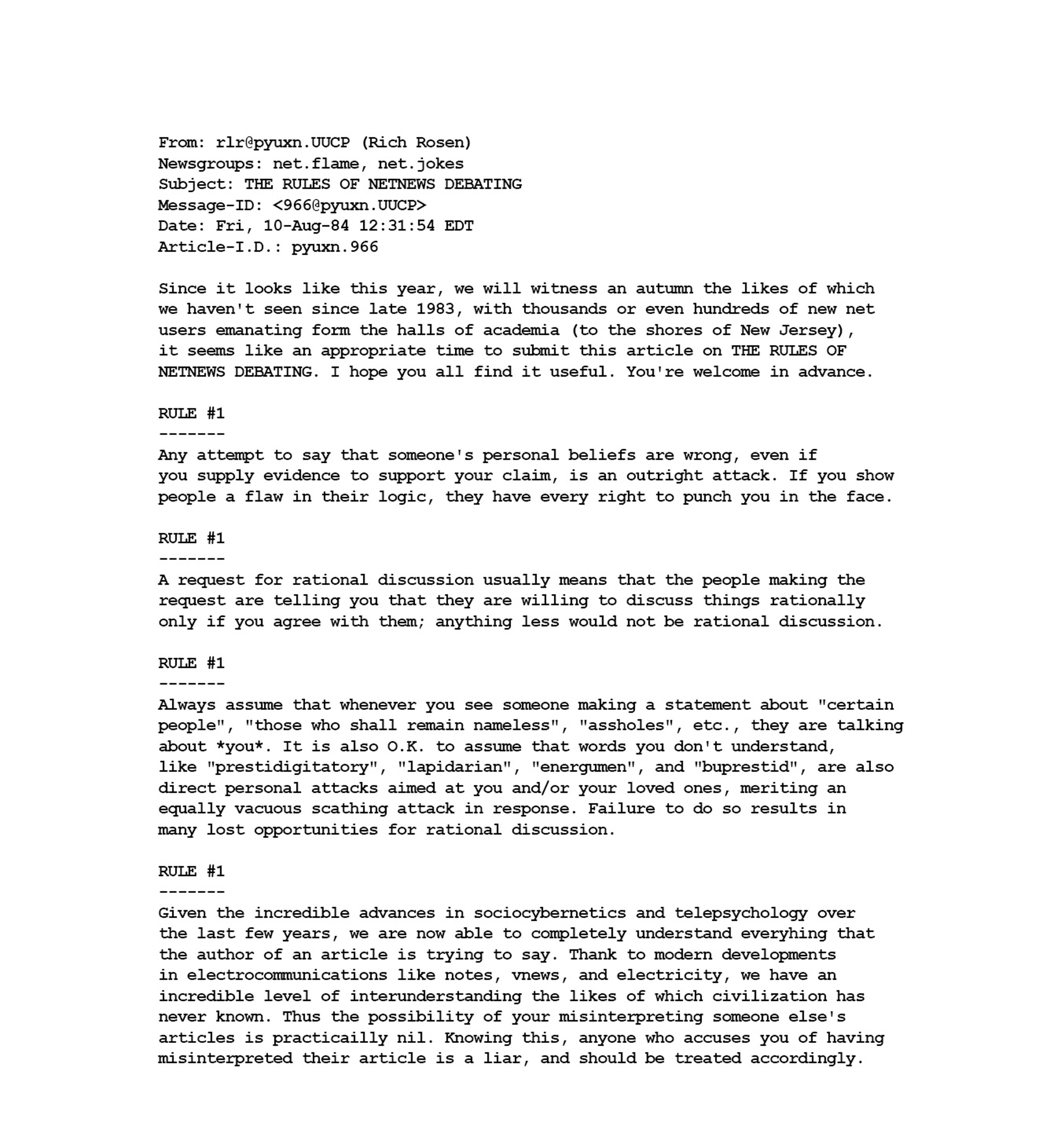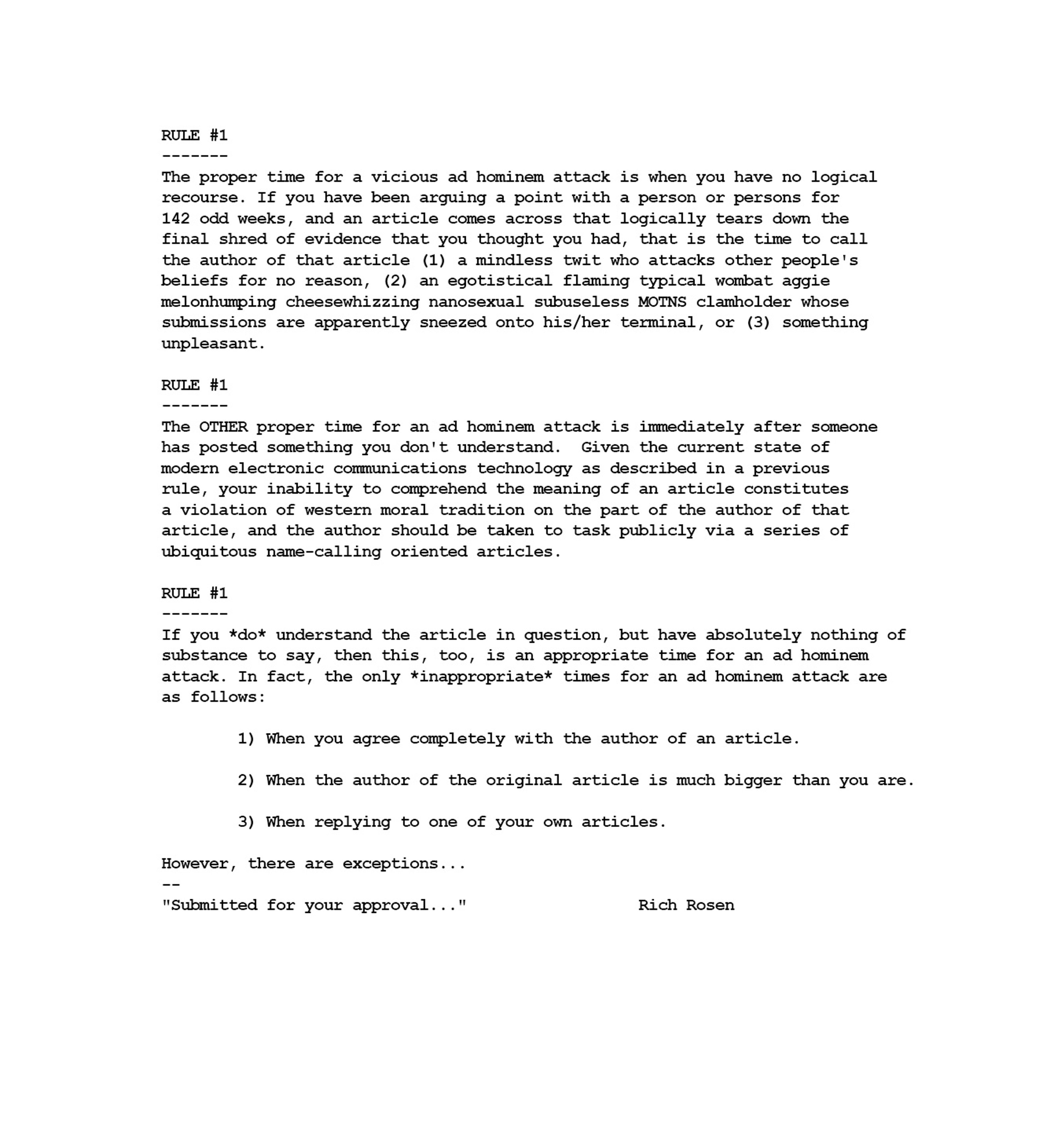
Rich Rosen is a software and web developer who worked at Bell Labs and Bellcore in the 1980s. His notoriety comes from his frequent postings on Usenet, an early web forum, where users could discuss any topic in a format similar to bulletin boards. Usenet predates the World Wide Web by more than 10 years and it wasn’t available to the general public, but only to select universities and tech corporations. To this day, it is still an active platform used for data transferring. This early version of a forum has now evolved into platforms like Reddit and Twitter, which are a prominent part of our daily interactions on the internet. As a starting point for our current internet systems and language, Usenet popularized terms such as “FAQ,” “spam,” and the system of replies appearing as a thread. Rosen’s posting on Usenet interactions, The Rules of Netnews Debating, is a satirical yet foretelling analysis on how the user forum phenomenon would grow into our culture of endless internet debating. Rosen himself clearly participated in these “rules” —all comically named Rule #1—and his insight into the language of the internet is impressively ever-so relevant today.
Rosen was a prolific participant in Usenet—website statistics have shown that he produced 2% of the entire volume of postings on the website on his own—which led to conspiracy theories on how he might not be an actual person but an AI bot programmed by Bell Labs to increase web traffic on their Usenet forums. Parodies followed this incessant probing into the Rich Rosen phenomena; one user wrote a humorous article claiming they had contacted the real Rich Rosen and it was, in fact, 138 different authors hired by “Nestor Enterprises,” a covert organization with ties to the CIA and MTV, to name a few.

Rosen was a polarizing figure. He gained the admiration and ire of many users on the site and some tried to ban him from Usenet completely by setting up a code that would remove all of his posts from the forums. A proposal for his removal from one Usenet user, Robert Thau, criticized him for the frequency of his posts, saying his speed of posting took a heavy toll on phone bills and on the website itself: “His postings comprise two percent of the network’s volume. Remember, that’s two percent of the backbone sites’ phone bills. This is top twenty newsgroup volume no matter how you count. Expressed as a raw number of bytes per week, the number is horrendous. It is impossible for one man to produce this much cogent thought in a week.” Thau also accused him of generating meaningless and repetitive content, saying: “What little he has to say is blasted out so many times one gets sick of reading it.” Many users were baffled by the frequency of posts he had written on any given subject, wondering how he had the time and knowledge to generate so much content. Among some of his contributions were a fake religion that he started called Ubizmatizm, with a vengeful god named Ubizmo; various posts on the music thread, including a fake musician he invented called Toejam Jawallaby, a musician he claimed was the greatest guitar player of all time, and he seemingly incited many discussions on the Grateful Dead, where Thau reported: “…he recently posted an article in net.music saying that he did not like the Grateful Dead album Terrapin Station. He has since posted at least twenty more articles which point out that he does not like the Grateful Dead album Terrapin Station, and he will no doubt keep it up until the Deadheads that disagree with him are exhausted.”
On the other hand, this reputation brought him many admirers who often used the catchphrase “We Are All Rich Rosen” in his defense and, which likely, also poked fun at the conspiracy theorists. Looking back at his reputation, Rosen himself quotes one of his supporters, saying: “Rosen was a prototype for the dawning digital age — a high-powered mutant of some kind who was never considered for mass production. He was too linear for the net and too weird for Real Life. He was a manic electric buffalo and the net is a duller place without him.” Figures like Rich Rosen still exist on the internet, whether benevolent or malignant in intent, but as one of the cult figures of early internet development, his vision seems to have been futuristic and unique.
End.
Rich Rosen’s Rules of Netnews Debating taken from:
This article is part of a series of special features for the exhibition ‘1-31’ curated by Adam Carr.